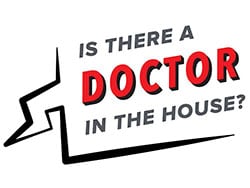
Emergencies happen anywhere, anytime — and sometimes physicians find themselves in situations where they are the only ones who can help.
Is There a Doctor in the House? is a new Medscape series telling these stories.
I was at mile 3 when the first incident happened.
I'd signed up for the Monterey Bay half marathon with my oldest daughter and son. It was going to be their first one. My daughter just turned 16 and my son is 14. They're both cross country runners at the local high school and you couldn't have asked for better race weather: not too hot, not too cold.
And then, boom — a runner collapsed about 30 feet in front of me. It was pretty clear that it wasn't just a trip or a faint or a stumble. When I got to him, he was unconscious and unresponsive. He had a head wound as well from hitting the pavement. After a quick assessment it was clear he had no pulse and was not breathing.

Dr Steven Lome
I started chest compressions. A lot of runners just went past. But pretty quickly, three other people stopped to help. I believe two of them were nurses or paramedics. Another was a neurosurgeon who assessed the runner's head and stabilized his neck. We took turns doing CPR for 5 or 6 minutes until the defibrillator arrived. When we hooked up the defibrillator, I could see the heart rhythm was ventricular fibrillation.
We delivered one shock and the rhythm returned to normal. I continued CPR after that for a short time. But after a couple of minutes, he woke up. He was pretty confused. We got him into the ambulance and off to Community Hospital of the Monterey Peninsula he went.
I was a little frazzled after that. Should I continue the race or just call it a day? I had spent a good amount of time at that spot and mentally it was a lot to go through. But I decided, All right, I'm going to keep going. My two kids were ahead of me, and I knew I couldn't catch up with them. But I had to finish the race.
I walked intermittently because I was on the phone with the emergency room and the interventional cardiologist and the critical care ICU physician. But the race went smooth, and I continued on and crossed the finish line. I threw my arms up into the air. Yay! I finished!
And then I heard somebody shout, "We need some help over here!" Another runner had gone down unconscious. He was about 10 or 20 feet past the finish line — again with a bleeding head wound. For a millisecond, I thought, How could this be happening again? But then all of my attention focused on assessing the runner.
Again, not breathing and no pulse. I immediately started chest compressions. Within a minute, a medical race volunteer brought a defibrillator. We hooked him up real fast, and the defibrillator said, "Shock advised," which indicates fatal arrhythmia. We shocked him and I continued chest compressions.
Less than a minute later, he looked up and said, "What am I doing down here?" And then he immediately went on his watch and turned off his Strava to record that he finished the race!
At that moment, the Big Sur Marathon Foundation's medical director, John Ellison, MD, arrived at the scene. He's an ER physician with Community Hospital. We assessed the patient's neck, and he was fine. We got him into an ambulance, and away he went to the hospital too.
Again, I called the emergency room, the interventional cardiologist, and the ICU physician to let them know about the second resuscitation.
I was in a daze after that just trying to comprehend what had happened. Unbelievable. Dr Ellison later said that when the first one happened, he was thinking, Wow, this is a once-in-a-decade event happening in our race. And then the second one happened!
I looked up the statistics. About 1 in every 200,000 runners has a cardiac arrest during a half marathon. There were about 6500 people there. So, if you do the math, that's about a one in a thousand chance of two runners having a cardiac arrest in the same race. But what are the odds that I was behind both of them? That's the crazy thing. Would you call it a miracle? I don't know. But it's quite unusual.
The next day, I visited both patients in the hospital. They made excellent recoveries, which is great, because in general the survival rate for out-of-hospital cardiac arrest is around 5%. It was really because of the race directors and the medical volunteers who were there, as well as the equipment available. Obviously, when you have a cardiac arrest, it's easier to get help quick with a lot of people around.
It's easy to take a story like this and focus on how everybody should learn how to use a defibrillator, which is important. Learning how to do CPR and use an AED is very simple and can save a life. But wouldn't it be even better to prevent the cardiac arrest from happening in the first place?
I had my own aha moment in 2014. I have a family history of heart disease. And at 260 something pounds, I was starting to have a lot of health issues. My blood pressure was going up. I had developed sleep apnea, acid reflux, and horrible back pain. I remember going up a flight of stairs in my house carrying a relatively light box, and I had to stop to catch my breath.
I have six children. And I thought, I have to be around for my kids. That's when I started changing my diet toward plant-based and I lost nearly 100 pounds. I ran my first full marathon in 2014, and since then, I've run 10 marathons and at least 30 or 40 half marathons.
My love of running let me be there, at the right place at the right time, and I'm thrilled both these patients have done so well. They each wound up having a blocked vessel opened with an angioplasty stent procedure at the hospital.
I'd love to invite them back to run again next year — if their cardiologist clears them.
Steven Lome, DO, RVT, is a cardiologist with Montage Medical Group in Monterey, California.
Are you a physician with a dramatic medical story outside the clinic? Medscape would love to consider your story for Is There a Doctor in the House? Please email your contact information and a short summary of your story to access@webmd.net
Read more in the series:
A Post-Super Bowl Airplane Emergency
A Plane Crash Interrupts a Doctor's Vacation
For more news, follow Medscape on Facebook, Twitter, Instagram, YouTube, and LinkedIn
Credits:
Lead image: Medscape
Image 1: Montage Health
Medscape Medical News © 2022 WebMD, LLC
Send news tips to news@medscape.net.
Cite this: Half Marathon Heart Crisis -- Times Two - Medscape - Dec 01, 2022.












Comments